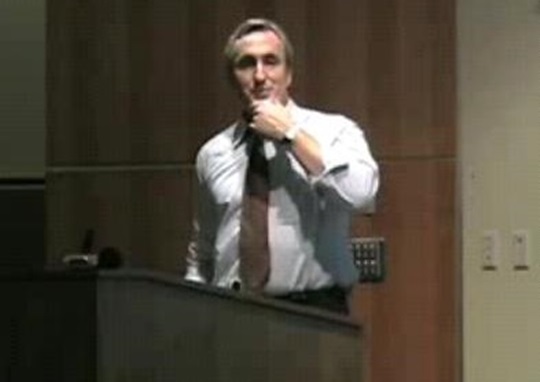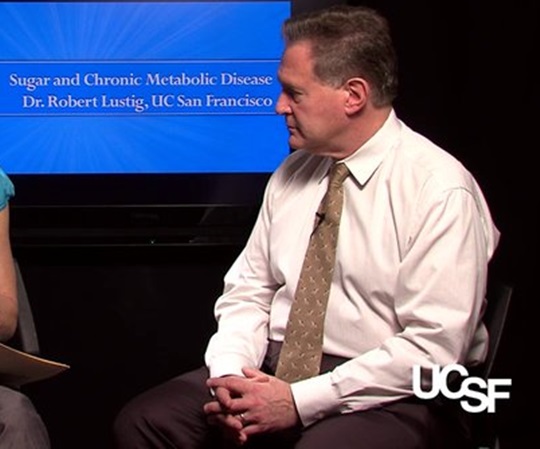“I don’t mean to insult you, but most journalists are idiots.”
-AIDS activist Luke Sissyfag to journalist Paul Sheehan, 1996.
—
LUKE Sissyfag was born Luke Montgomery, in 1974. A precocious lad, at 17 he changed his name by deed poll, and it didn’t take long for his new moniker to start making headlines. By the ripe old age of 21 he had heckled Bill Clinton six times, disrupted speeches by the Secretary of Health, appeared on The Phil Donahue Show, conducted hundreds of interviews around the USA, and even run for Mayor of Washington in 1994 on the platform, “AIDS is the issue”.
Sissyfag was the lipstick-wearing heckler who shouted down President Bill “Slick Willie” Clinton on World AIDS Day, 1993, and was subsequently dragged away by secret service agents.
Many of you, at this point, are no doubt wondering why I’m discussing the antics of a militant AIDS activist in an article whose title also mentions a couple of prominent low-carb dogmatists. If that’s you, hang about, because the story of Luke Sissyfag is massively relevant to the point I will be making today.
Journalists, and Why Bullshitters Love ‘Em
Luke Montgomery has undergone quite the transformation since his angry heyday of the early 90s. He subsequently dropped the Sissyfag surname and in, a dramatic turnaround, became a vocal critic of what he saw as the childish self-indulgence and blatant dishonesty displayed by many in the gay activist movement.
That dishonesty included, but was not limited to, the deliberate dissemination of false claims about the susceptibility of heterosexual women to AIDS, and the prevalence of homosexuality among males.
When journalist Paul Sheehan asked Montgomery in 1996, “You admit you were cooking the statistics?”, the latter stated outright:
“Absolutely! … We used to skew statistics on a regular basis. We could make one statistic say the opposite of what it really meant, and it’s very simple to do. For example, claiming that AIDS is growing most rapidly among young heterosexual women … It was just scaremongering. Media manipulation.”
And the unlikely yet oft-repeated claim that 10% of men are gay? As Sheehan noted in his 1996 article, “The latest General Social Survey conducted by the University of Chicago found last year that 2 per cent of the men surveyed had engaged in homosexual sex and 1 per cent considered themselves to be exclusively homosexual. These figures align with other recent studies: in the US in 1992 (2.4 per cent), France in 1992 (1.4 per cent), Britain in 1991 (1.4 per cent) and Canada in 1990 (1 per cent). Even the Kinsey Institute, which started the 10 per cent myth 40 years ago with studies now completely discredited, found in a more recent study that only 1.4 per cent of its interview subjects defined themselves as homosexual.”
So how, exactly, did Montgomery and his former activist colleagues succeed in having patently false statistics reprinted in newspapers all around the world?
“One thing I learned quickly was that if you could write a really good press release, you could write the story,” Montgomery told Sheehan. “I don’t mean to insult you but from my experience most journalists are idiots.”
I can’t say I disagree with him. I never ceased to be amazed at the utter garbage that routinely appears in newspapers and current affairs shows. Whether it’s hunger for ratings, a woeful lack of intelligence and critical thinking skills, or perhaps a combination of these and other factors, journalists are amazingly adept at presenting us with sensationalist bullshit that we are supposed to accept at face value. And the terribly sad reality is that, most of the time, they succeed in this very goal.
The ABCs of Anti-Carb Bollocks
For the edification of readers outside Australia, the ABC (Australian Broadcasting Commission), also known Down Under as “Channel 2”, is a government-owned, taxpayer-funded TV station that first went to air in 1932. Being a “non-commercial” station, it is free of advertisements and has long served as an alternative to the remaining handful of “free-to-air” commercial stations that feature both heavy advertising and a large proportion of American programming.
I used to like the ABC because, in between the lame British comedies, they would often air some great documentaries, the candid and revealing kind you would rarely see on the commercial networks. Unfortunately, the quality of ABC content seems to have taken a noticeable dive in recent times; maybe it’s just me, or maybe it’s a result of increasing pressure for the ABC to become more “business-like”.
The ABC is also well known for its current affairs and investigative reporting-type shows. One of these is Catalyst, which the ABC bills as “Australia’s premier science investigation series … an exciting half hour of Australian and international stories”.
I’m not a regular watcher of Catalyst, but occasionally catch an episode when I go over to my Mum’s place for dinner. And so there I was, sitting on Mum’s comfy Chesterfield, enjoying the ecstatic post-meal bliss that IMC (Italian Mum Cooking) is well known to induce. The TV was tuned to Channel 2 when all of a sudden my ears pricked up – from above the conversation, I heard the words “toxic sugar” emanating from the idiot box. I focused my attention on the screen and was treated to Catalyst’s preliminary blurb for the first of the two stories that appeared on the show that evening.
I knew the segment’s scientific credibility was in trouble when none other than Gary Taubes’ tired, greying mug appeared on the screen; when this was followed by footage of the rabid Robert Lustig, I suspected I was in for, not “an exciting half hour”, but some 15 minutes of excruciating bullshit.
My suspicions were confirmed, and then some.
Yep, last Thursday (8 August, 2013), “Australia’s premier science investigation series” presented its viewers with a segment titled “Toxic Sugar?” that featured a litany of idiotic claims about exercise, carbohydrates, insulin, and fat loss.
Rather than post an exhaustive, extensively-referenced critique of each and every piece of hogwash spouted on Catalyst that night, I figured it would be much more instructive to share with readers an email I sent a few days after the show to Maryanne Demasi, the journalist responsible for the “Toxic Sugar?” segment. Her subsequent reply is also shown below (those with a high bullshit pain threshold can also view the actual episode here).
This, by the way, is not the first contact I’ve had with Demasi – more on that later.
—
Anthony Colpo to Maryanne Demasi, Aug 11, 2013.
Re: Catalyst ‘Sugar’ segment
Dear Maryanne,
just writing to say how disappointed I was with your “Toxic Sugar?“ segment that aired on Catalyst the other night.
Let me preface by stating I wholeheartedly agree excess sugar consumption can lead to a wide array of adverse health consequences. Your segment had the potential to make a worthwhile statement on the matter, but instead quickly degenerated into an alarmist, pseudoscientific farce.
This was in large part due to the two so-called ‘experts’ who featured most prominently in the segment: Author/journalist Gary Taubes and pediatrician Robert Lustig, both of whom made claims that were utterly false.
The few brief highlights of the segment, such as your mention of the commercially-driven dubiousness of the National Heart Foundation’s “Heart Tick” program, were totally overridden by the shrill and untenable claims made by the aforementioned commentators.
I was especially dismayed to see Taubes repeat his repeatedly disproved claim that exercise does not assist fat loss, and your complete lack of critical scrutiny of this patently absurd statement.
This claim doesn’t even begin to pass the commonsense test, but I do realize commonsense is in very scarce supply these days. So let’s look at what science has to say on the matter:
–As physical activity levels/calories burned from physical activity increase, body mass index decreases in both adults and adolescents (see, for example, Table 1 of Weinstein 2004, also Sulemana 2006).
This finding should readily fall into the category of NSS (No Shit Sherlock!) … that I even need to mention it is a sad, sad reflection on the modern state of journalism.
But let’s continue.
Taubes claims the reason why exercise fails to produce weight loss is because it simply makes you hungrier.
In people who exercise vigorously, this is often true. But what Taubes conveniently neglects to mention is that any increase in hunger brought about by exercise is in response to the increased caloric expenditure of exercise and that any subsequent increase in caloric intake is typically overridden by the increased calorie burn from exercise.
Unlike Taubes, who carefully cherry-picks the studies that support his science-fiction and ignores those that do not, C. Alan Titchenal conducted an extensive review of the research on this very subject (see attached) and found:
“Energy intake in humans is generally increased or unchanged in response to exercise. When energy intake increases in response to exercise it is usually below energy expenditure, resulting in negative energy balance and loss of bodyweight and fat. Thus, if energy intake is expressed relative to energy expenditure, appetite is usually reduced by exercise.
Highly trained athletes and lean individuals usually increase energy intake in response to increased levels of exercise, whereas untrained or obese individuals often do not change energy intake in response to increased physical activity…”[Titchenal 1988]
More recently, Elder and Roberts undertook a similar review of the literature and came to similar conclusions:
“The results show consistent effects of exercise on body fatness in the absence of prescribed dietary change, with a progressive loss of body fat associated with higher exercise energy expenditures in both men and women. In part, these effects appear to be mediated by a spontaneous reduction in hunger associated with participation in exercise.”[Elder & Roberts 2007]
Which I guess is why you don’t see any obese blokes competing in the Tour de France, as pro cyclists have pretty enormous calorie expenditures. Taubes has claimed elsewhere – in all seriousness – that this is because pro athletes like Lance Armstrong were simply born lean. Well, Taubes’ ludicrous theory didn’t hold up when the greatest road cyclist of all time, Eddy Merckx, retired from racing. Renowned for his voracious appetite, Merckx failed to match his caloric intake to the sudden and drastic drop in post-retirement caloric expenditure, and promptly became overweight as a result. I’ve written about this here:
So epidemiological, empirical and clinical trial evidence shows Taubes’ claim to be nonsense. Which of course doesn’t deter him one bit from repeating it every chance he gets. How sad you provided him with yet another platform for again misinforming people and discouraging them from such a highly beneficial activity.
Now let’s turn our attention to Dr Lustig. Like Taubes, he is hopelessly devoted to the nonsensical belief that carbohydrates, via their effect on insulin, increase body fat gain. Most disappointingly, you repeated this mantra in sing-song fashion, evidently unaware that this too has been repeatedly and decisively debunked.
If insulin makes us fat, could you please explain the following anomalies:
–Why differences in insulin resistance and blood sugar control are not a reliable predictor of weight loss in response to calorie restricted diets in obese women?[McLaughlin 1999][de Luis DA 2006].
–Why, given the astronomical financial rewards awaiting innovators of effective fat loss drugs, Big Pharma – world famous for its relentless and often unethical pursuit of profits – is hardly tripping over itself to bring insulin-lowering obesity drugs to market? Or why it is not promoting/seeking approval for the use of already available insulin-reducing drugs for this purpose?
–Why overweight and obese subjects placed on a calorie-restricted diet and randomly assigned to the insulin-lowering drug diazoxide did indeed develop lower insulin levels than those on placebo, but experienced no difference in weight loss, fat loss, resting energy expenditure or appetite?[Due 2007]. (I guess the answer to that will also give you the answer to the previous question…)
–As for carbohydrates themselves, you claimed “starch” was fattening. If so, then why do the white rice-devouring Japanese enjoy lower rates of obesity than most Western countries – including obesity chart-toppers like Australia and the United States of Supersize Me – despite consuming a higher percentage of their calories as carbohydrate?
–If low-carb diets are so superior for weight loss, why do all the RCTs lasting 12 months (long enough for the short-term satiety and novelty factors to wear off) or more show no difference in weight loss or compliance rates as compared to low-fat, high-carb diets?
–Could you also explain why, if dietary carbohydrate is so inherently fattening, why metabolic ward studies (the only kind in which isocaloric intakes can be assured) have repeatedly failed to show any greater non-fluid weight or fat loss than isocaloric diets high in carbohydrate?
One of these ward studies did find a low-carb diet led to greater visceral fat loss in type II diabetics [Myashita 2004], but overall fat or weight loss was not different from the high-carb group. I could go on about how iron reduction, low-GI nutrition, and exercise are all alternatives (far superior ones, in my opinion) for improving glycemic control in diabetics, but that’s a discussion for another time. The point here is that ward trial after ward trial has shown the claims made on your show about carbs, insulin and fat gain to be totally false. I won’t bother listing the two dozen+ references for these ward studies here because, being the most important evidence of all in any debate about the alleged fattening effects of carbs, you already examined them all prior to airing your segment…right?
These ward studies, by the way, stretch as far back as 1935 and have repeatedly failed to find the so-called “metabolic advantage” espoused by Taubes, Lustig et al. But these individuals, hopelessly wedded to their low-carb dogma, are still stuck in the Atkins Dark Age, which most of humanity discarded circa 2004 AD.
Your Catalyst segment, it seems, would have us go right back to this hyperbolic era, believing that the key to losing body fat is not exercise and/or caloric restriction (both of which have been repeatedly shown in controlled research and real life to actually work), but to instead embrace the already failed approach of ignoring calories and instead focusing on carbohydrates.
In other words, let’s replace pseudoscientific anti-fat idiocy with pseudoscientific anti-carbohydrate idiocy.
No thanks.
What’s really sad about this is that your personal blurb on the ABC site claims that you are a “medical research scientist”, have a PhD, and have “been awarded National Press Club of Australia prizes in 2008 & 2009 for…Excellence in Health Journalism”.
All these sterling credentials, yet when some joker came on your show making the patently stupid and blanket claim that exercise does not assist fat loss, you didn’t even begin to question his statement?
When some pediatrician who would have us all believe fructose is the new thalidomide claimed that carbs, not calories, were the cause of obesity, did you make any attempt at all to consult the vast amount of literature showing this claim to be false?
Why are you journalists so uncritically accepting of such easily-disproved rot?
I’d love to hear your answers to all these questions, but please consider when replying that I may and probably will reprint your reply on my website. Media propagation of dietary and health pseudoscience is not only a perennial source of interest/dismay/bemusement for myself, but also many of my readers.
Kind regards,
Anthony.
PS. The following is also a worthy read re Robert Lustig:
http://www.alanaragonblog.com/
Maryanne Demasi to Anthony Colpo, Aug 11, 2013.
Hi Anthony,
Yes, I’ll try and answer this email as soon as I can’t but I it may take a couple of weeks. I’m working to a tight deadline doing a 1 hour on cholesterol and heart disease….its the story we talked about a couple of years ago after reading your book. In fact, you may be helpful in assisting with factual accuracy with this story…are you happy for me to run through it with you in a couple of weeks when the script is written?
Maryanne
Anthony Colpo to Maryanne Demasi, Aug 11, 2013.
Hi Maryanne,
unfortunately I won’t be able to assist in the fact-checking of your cholesterol story…but I’d still be interested to learn why you allowed such nonsensical statements by Taubes and Lustig to air on your “Toxic Sugar?” segment.
Kind regards,
Anthony.
Maryanne Demasi to Anthony Colpo, Aug 11, 2013.
Ok, I’ll get to it as soon as I have free time.
Cheers
M
—
So there you have it. Whether Demasi follows through on her promise to answer the questions I posed remains to be seen, although I must say I’m rather sceptical. I couldn’t sum up her reply any better than a good friend who, upon viewing Demasi’s email, remarked:
“Wow. So her response is ‘I don’t have time right now to admit that I effed up and did no research. Can you help me do additional work that I will take credit for?’”
Regarding Demasi’s rather audacious request that I help her with a segment on cholesterol that “we” spoke about while simultaneously deflecting my questions…the last time “we” spoke was 3 years ago, back in September 2010. Demasi had contacted me after learning about me online, and was apparently interested in doing a segment that questioned whether cholesterol really caused heart disease. Given the sad lack of attention awarded to this issue in the mainstream media, I was initially more than happy to help. But in the course of our subsequent communication, both by email and phone, Demasi’s focus seemed to shift from diet, cholesterol and heart disease to the potential relationship between statins and cancer, and then back again. I quickly started to get the impression she really didn’t know what angle to approach the issue from.
At the same time Demasi was communicating with me, she was also emailing a representative of Australia’s National Heart Foundation, who not surprisingly held polar opposite views to mine about cholesterol and CHD. Demasi would email this person’s answers to me and expect me to provide point-by-point rebuttals. The first time this happened, that’s exactly what I did. I cited studies that refuted this person’s claims and explained their results, in addition to sending Demasi a free electronic copy of The Great Cholesterol Con, and a number of other PDFs that included my published paper on LDL cholesterol.
When Demasi sent me another email with a long-winded reply from the National Heart Foundation that she again wanted me to address, I decided enough was enough. While the NHF representative was no doubt drawing a nice salary for his PR duties, I was answering Demasi’s incessant queries on my own time and starting to wonder exactly what the point of the whole exchange was. I ignored her last email; she subsequently phoned and I explained to her that she needed to work out a solid angle before proceeding with her story. I explained that pursuing the statins-cancer angle was not a good idea, because the link was quite weak. I explained that while the early animal toxicology studies and bits and pieces of subsequent human evidence had suggested a link, the drug companies would be able to flood her with a bunch of published papers purporting to show no relationship between statins and cancer incidence.
I explained there were far better angles from which to approach a cholesterol-heart disease story from. I told her she needed to make sure whatever angle she chose was one she could back up with plenty of supportive evidence, because those with a vested interest in the cholesterol paradigm would be sure to throw a hissy fit and unleash their PR monkeys in response (and I wasn’t joking: When Channel 7’s Today Tonight did a story on statins and transient memory loss – a real and documented side effect of statins – a few years earlier, Pfizer promptly responded by placing full page ads in every major Australian newspaper reminding the public what a wonderfully upstanding and humanitarian outfit they were. Pfizer also sent a letter to every doctor in Australia reassuring them that statins were wonderfully safe drugs and solemnly advising them to ignore the concerns raised by the naughty folks at Today Tonight).
And, until last Sunday, that was the last I heard from Demasi.
Needless to say, I feel little incentive to help someone who has already impinged upon my time and whose most recent TV outing demonstrates a sad lack of critical analysis, research skills, and plain commonsense. To be fair to Demasi, she’s hardly alone on this score. Poor research and the uncritical relaying of nonsensical claims made by so-called ‘experts’ are not rarities but par for the course among journalists. With the exception of a single genuine and tenacious reporter from Today Tonight, my dealings with this profession have pretty much led me to the same conclusion as that asserted by Luke Montgomery.
It’s truly regrettable that so many individuals with so little ability and/or desire to separate fact from hogwash are endowed with the ability to influence the perception of thousands, and often millions, of others.



“Oh, they could look lean and healthy if they wanted to, but they just prefer the soft, flabby, tired look!” One question I forgot to ask Demasi was why, if they know so much about fat loss, are Taubes and Lustig in such appalling shape? These individuals openly ridicule both the “calories in/calories out” paradigm of weight loss and those of us who sensibly acknowledge it, so why are they the ones sporting such prodigious waistlines?

What does Italian hottie Cristina Buccino have to do with dodgey reporting and anti-carb propaganda? Nothing really, my eyes simply craved for some visual relief after those photos of Taubes and Lustig! Italian women, by the way, recently checked in as the second slimmest female population in all of Europe. Let’s hear it for pasta, pizza, risotto, and pane bianco (white bread)!
—
Anthony Colpo is an independent researcher, physical conditioning specialist, and author of The Fat Loss Bible and The Great Cholesterol Con. For more information, visit TheFatLossBible.net or TheGreatCholesterolCon.com
Copyright © Anthony Colpo.
Disclaimer: All content on this web site is provided for information and education purposes only. Individuals wishing to make changes to their dietary, lifestyle, exercise or medication regimens should do so in conjunction with a competent, knowledgeable and empathetic medical professional. Anyone who chooses to apply the information on this web site does so of their own volition and their own risk. The owner and contributors to this site accept no responsibility or liability whatsoever for any harm, real or imagined, from the use or dissemination of information contained on this site. If these conditions are not agreeable to the reader, he/she is advised to leave this site immediately.